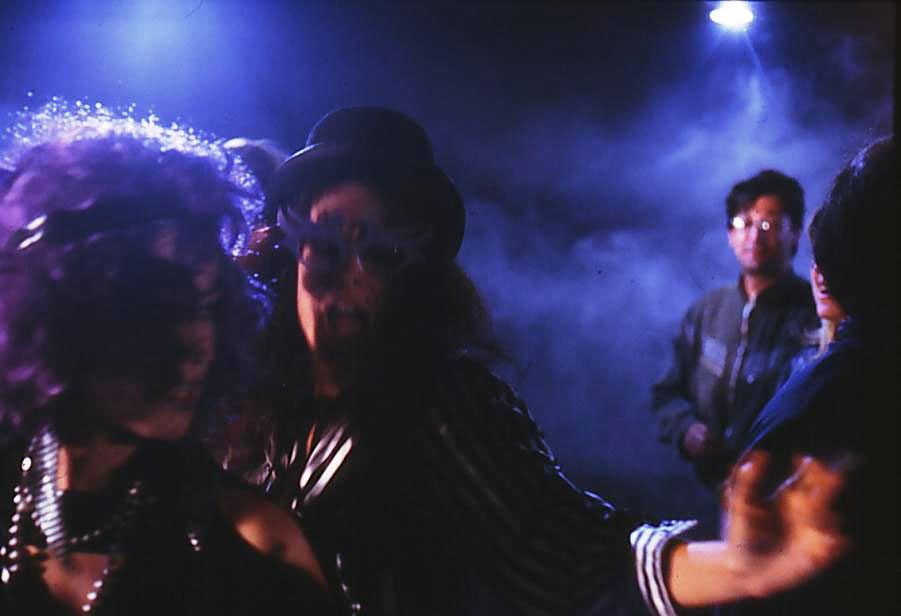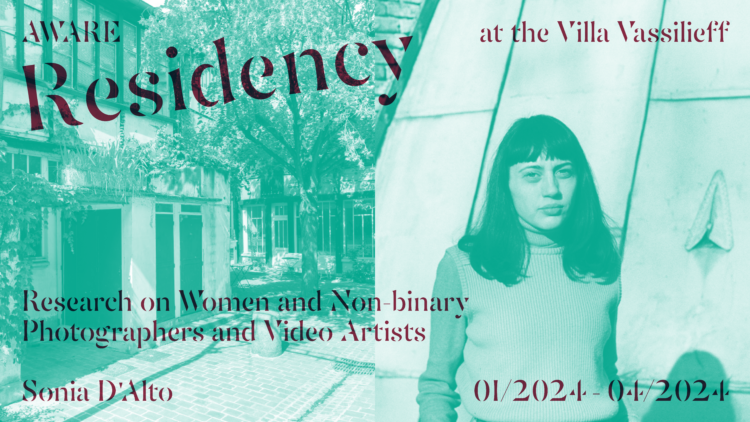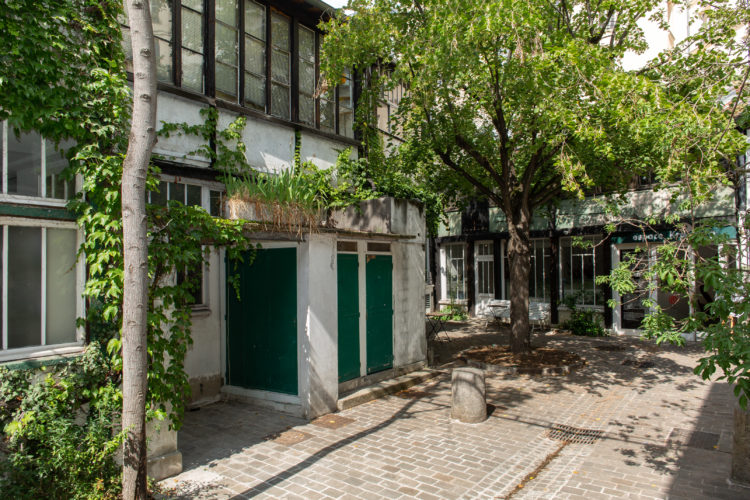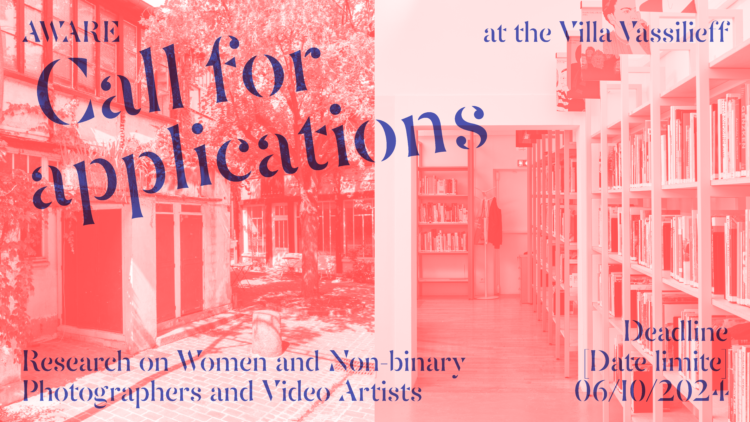Events
Still frame from the film Didone non è morta (Dido Is Not Dead), dir. by Lina Mangiacapre (1987) with Le Nemesiache, Courtesy Le Nemesiache and Mangiacapra Archive.
21, avenue du Maine
75015 Paris
Montparnasse – Bienvenüe metro station, Exit 2, Lines 4, 6, 12 and 13
Villa Vassilieff is accessible to visitors using wheeled devices or who have mobility difficulties thanks to special facilities (access ramp, adapted toilets, and a lift).
In addition, several reserved parking spaces are available close to the Villa Vassilieff:
• in front of 4 rue d’Alençon, 75015 Paris
• in front of 7 rue Antoine Bourdelle, 75015 Paris
• in front of 23 rue de l’Arrivée, 75015 Paris
Consult the map of adapted parking spaces in Paris here.
This two-part event, conceived by AWARE researcher-in-residence Sonia D’Alto, will delve into the audiovisual production of the Neapolitan feminist collective Le Nemesiache and activate a trans-generational dialogue with selected contemporary artistic practices and research.
In recent years, the Neapolitan feminist artist group Le Nemesiache has gained renewed attention due to their experimental artistic practice and way-of-being-in-the-world based on feminism, mythology, folktales, sci-fi, and radical imagination. Researcher-in-residence at AWARE and curator Sonia D’Alto, who has been carrying out research on the group for several years, introduces their interdisciplinary practice that encompasses film, performance, critical writing, painting, poetry, music, collage, and costumes.
Practical information
4 and 25 April 2024, from 6:00 to 8:15 pm
Please register here for the event on April 25.
The conversation will be held in French, English and Italian.
April 25, 2024: Reclaiming Mythological Rituals II
This second event of the series will aim to create trans-generational continuity with selected contemporary artistic practices and research that explore different mythologies, the potentials of critical fabulation, and collaborative approaches. The event will feature a screening of the short film our songs were ready for all wars to come by Palestinian artist and researcher Noor Abed and a performance by Italian artist and researcher Giulia Damiani.
April 4, 2024: Reclaiming Mythological Rituals I
In recent years, the Neapolitan feminist artist group Le Nemesiache has gained renewed attention due to their experimental artistic practice and way-of-being-in-the-world based on feminism, mythology, folktales, sci-fi, and radical imagination. Researcher-in-residence at AWARE and curator Sonia D’Alto, who has been carrying out research on the group for several years, introduces their interdisciplinary practice that encompasses film, performance, critical writing, painting, poetry, music, collage, and costumes.
In the ‘70s and ‘80s, Le Nemesiache held several site-specific interventions in the urban and natural space of the Neapolitan area. However, they are best known today for their contribution to women’s cinema for their films that conjure art and feminist activism, ancient myth, and sci-fi. Nevertheless, Lina Mangiacapre’s seminal writings of poetry and film theory, her fervent experimental and collaborative film production, as well as the foundation of the off-program section at Sorrento Film Festival dedicated to feminist cinema, remain a neglected area of study.
In this regard, the evening features a conversation with Claudia Aglione and Bruna Felletti, two members of Le Nemesiache, and the projection of two 8 mm short films written and directed by Lina Mangiacapre in collaboration with the group: Il Mare Ci Ha Chiamate (1978) and Follia Come Poesia (1979). The conversation and the projection of the films explore the long-lasting engagement of Le Nemesiache (1970 — ongoing) with the collaborative practice characterizing their experimental filmmaking activities and celebrations of women’s creativity to overcome the secular colonization of their existence by the patriarchal culture. In particular, Il Mare Ci Ha Chiamate, addresses eco-feminist issues enlarged to local social actions; Follia Come Poesia, revolving around psychiatry and forced confinement, is a therapeutic proposal for the affirmation of the right to beauty of the marginalized, from the local sub-proletariat to the “mad” women’s, and it is the result of three years of work with Naples’s major psychiatric hospital.
Villa Vassilieff
Il Mare Ci Ha Chiamate [Called by the see], 1978, produced and directed with Le Nemesiache / Le Tre Ghinee Cooperative, S/8, 18 min
Aucune exigence linguistique
Follia Come Poesia [Madness like poetry], 1979, produced and directed with Le Nemesiache / Le Tre Ghinee Cooperative, S/8, 40 min
Italien avec sous-titres anglais
Villa Vassilieff
our songs were ready for all wars to come, 2021, S/8 with live sound composition, 20 min
This residency received the support of Neuflize OBC Foundation.
Sonia D’Alto is a curator and researcher. She is pursuing a practice-based PhD at the HFBK in Hamburg and has collaborated with art institutions, and collectives and participated in the organization of artist residencies. Her curatorial research and practice, manifested in critical and theoretical texts, lectures, exhibitions, workshops and edited publications, focuses on political imagination of the future, addressing the relationships between superstition and modernity, folklore and power taxonomies through feminist gestures, counter-colonial practices, and subaltern cosmologies. Currently, she is a lecturer at the Curatorial Studies postgraduate program at KASK in Ghent.
Noor Abed is an artist and researcher from Palestine. She works at the intersection of performance and film, as well as alternative pedagogy. Abed attended the Whitney Independent Study Program in Νew York in 2015-16, and the Home Workspace Program (HWP) at Ashkal Alwan, Beirut 2016-17. In 2020, she co-founded, with Lara Khaldi, the School of Intrusions, an independent educational collective in Ramallah, Palestine. Abed was a curatorial assistant for Documenta fifteen (Kassel, 2021-22). She is currently an artist in residence at the Rijksakademie in Amsterdam 2022-24 and was recently awarded the Han Nefkens Foundation/Fundació Antoni Tàpies Video Art Production Grant 2022
Giulia Damiani is a performance artist and writer based in Amsterdam. Her research intersects body, place, and feminist creative methods to arrive at ruptures in language and context. Giulia has taught art theory and performative writing at institutions including KABK, Rietveld Academie, HKU, University of Amsterdam, and Goldsmiths. She curated From the Volcano to the Sea: The Feminist Group Le Nemesiache in 1970s-1980s Naples at Rongwrong, Amsterdam in 2020 as well as Part II of the same show at Chelsea Space in London in 2022. That same year, she edited the reader Ritual and Display for the Amsterdam-based organisation If I Can’t Dance, I Don’t Want to Be Part of Your Revolution and received her practice-based PhD from the Art Department at Goldsmiths, University of London (AHRC scholarship). In 2023 she was awarded the Amsterdams Fonds Voor de Kunst AFK stipendium for her performance piece Heart Brake.
Mawena Yehouessi (aka M.Y or M/Y or MY) is born in Cotonou (Benin), and is an art curator, writer, researcher and artist. Founder of the Black(s) to the Future collective and currently undertaking a PhD at Villa Arson / Université Côte d’Azur, she lives and works between Paris and Nice. Trained in literature, philosophy, art projects management and contemporary dance, M.Y spans through alter-futurisms and poïethic realities : she (Mawena) and they (M/Y) work around an imploratory (rather than exploratory), collaborative and prospective methodology of collage where mediums and spaces oscillate from being visual/digital syncretism and film-making to poetry writing, translation, pedagogy, concept-coining, collective gathering, study, improvised dancing, making-up (cooking) parties and calling them exhibitions… Put otherwise, MY is part of those ghost generations of un-classifiable-beings, whose wor(l)ds, imaginaries, hustles & jobs are an aggregation of slashes, glitches, subcommoning and displacements.










